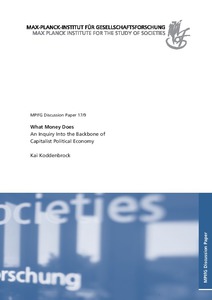What money does: an inquiry into the backbone of capitalist political economy

Max-Planck-Institut für Gesellschaftsforschung, Köln
MPIfG - Köln
2017
25 p.
capitalism ; economic theory ; financial sector ; international
Discussion Paper
Economics
English
Bibliogr.
"The theory and critique of capitalism is back at the center of scholarly debate. With it comes a growing awareness of the analytical and political importance of money and money creation. Moving from the more systemic reflections of Karl Marx to more recent work on money theory by Geoffrey Ingham and in financial economics, the paper focuses on three of money's “deeds.” As a social structure and process, it makes moneymaking through capital permeate all our societies. As a public-private partnership between the state, rentiers, banks, and taxpayers that has existed since the foundation of the Bank of England in 1694, it binds these actors together in shifting relations of dependence. In today's financial capitalism, what counts as money and how far moneyness stretches into the realms of financial innovation has been the core object of struggle in the public-private partnership of money. In conclusion, the paper discusses how contemporary money redistributes intra-socially and internationally."
Digital
The ETUI is co-funded by the European Union. Views and opinions expressed are however those of the author(s) only and do not necessarily reflect those of the European Union or the ETUI.